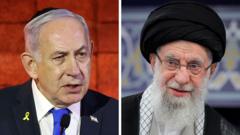Amid escalating tensions, Israel’s aggressive strategy towards Iran aims to destabilize its military leadership and capabilities, raising concerns of future retaliatory actions from Tehran.
Israel Intensifies Military Campaign Against Iran’s Elite: A Strategic Shift

Israel Intensifies Military Campaign Against Iran’s Elite: A Strategic Shift
Israel’s recent military operations against Iran mark a notable escalation, drawing parallels to past offensives against regional adversaries.
Israel has unleashed a powerful wave of military attacks against Iran, reflecting a significant intensification compared to last year’s operations. Drawing on tactics previously utilized against Hezbollah, Israel has not only targeted missile installations but has also sought to eliminate pivotal leaders within Iran's military hierarchy. The approach mirrors the Israeli strategy during the Lebanon conflict, which effectively curtailed Hezbollah’s operational capacity by neutralizing its top brass.
Recent reports from Tehran have showcased visible damage to specific structures, reminiscent of targeted attacks seen in Lebanon’s southern suburbs. This time, while the Supreme Leader Ali Khamenei remains unharmed, the loss of high-profile figures such as military chief Hossein Salami and various nuclear scientists represents an unprecedented level of impact on Iran’s elite.
Israeli Prime Minister Benjamin Netanyahu has hinted at the potential for prolonged military engagement, suggesting that the operations could extend over several days. This escalation implies that Iran may need to mount a significantly stronger response compared to its previous limited retaliatory actions last year, although it could simultaneously constrain Tehran’s options for an effective retaliation.
Netanyahu's timing for this aggressive posture seems deliberate, as it coincides with ongoing negotiations between the U.S. and Iran concerning Tehran’s nuclear ambitions. Citing assertions from Israeli military officials, the urgency stems from intelligence suggesting Iran possesses enough nuclear material to construct fifteen bombs within mere days.
For Netanyahu, pressing forward with military action may serve to preempt any unfavorable nuclear deal that could materialize as talks progress. His calculations appear influenced by assessments of Iran's weakened state as well as its regional affiliates, particularly Hezbollah, suggesting that current threats may not be as formidable.
As the situation evolves, upcoming hours and days will reveal whether this aggressive strategy pays off or represents a perilous gamble for Israel in its ongoing conflict with Iran.


















